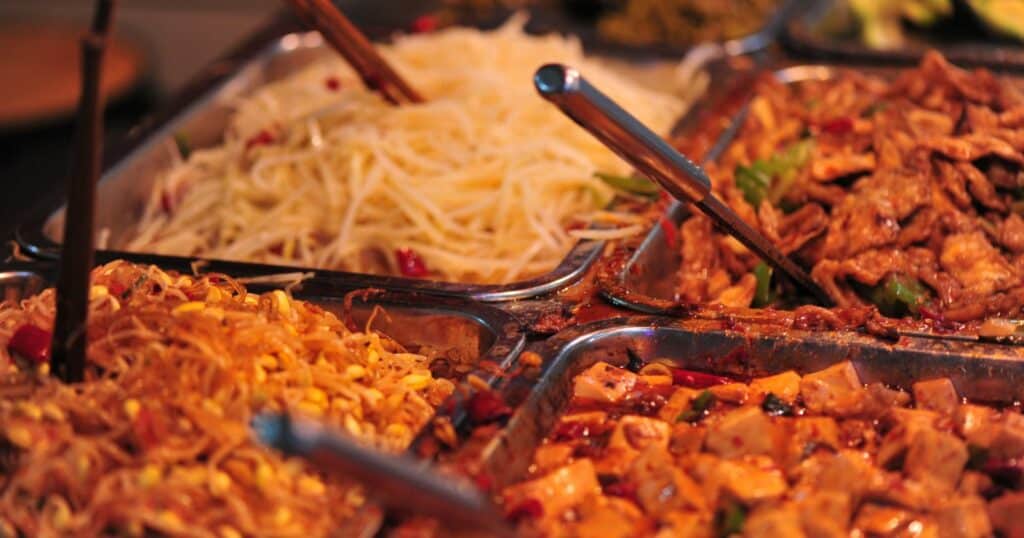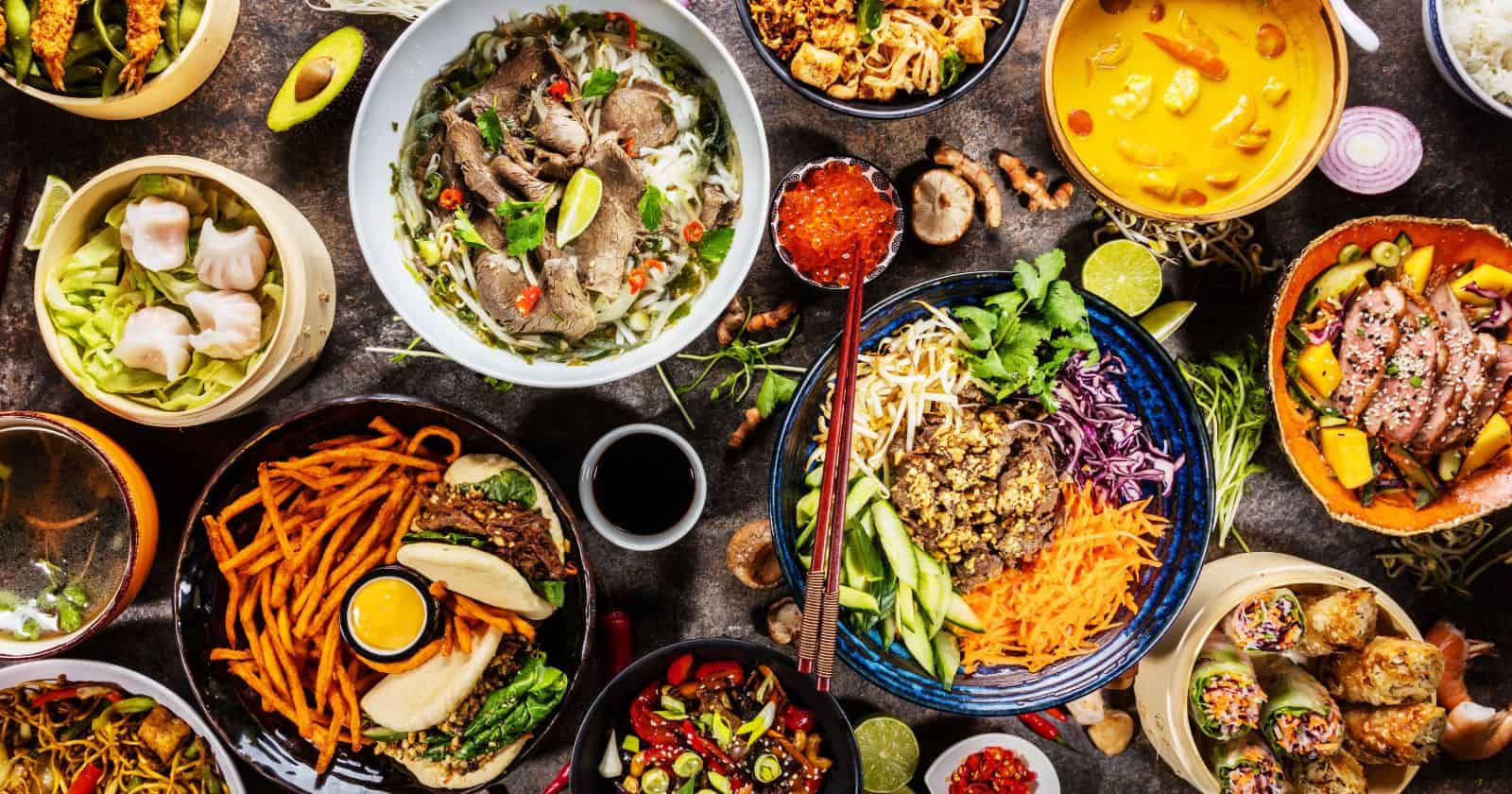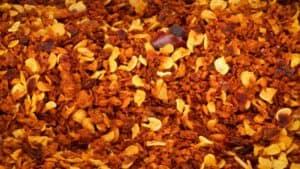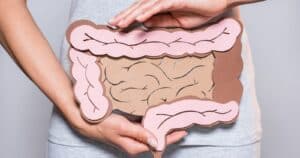Do you rush to the bathroom after eating your favorite pad thai or curry? Spicy noodle bowls and stir fries can wreak havoc on your digestive system.
If you’ve ever wondered why Asian food causes diarrhea, the likely culprits are:
- Fiber: Asian dishes contain lots of high-fiber veggies, grains and beans that can stimulate bowel movements.
- Spices: Ginger, garlic, chilis and other spices may irritate the stomach lining.
- Fat Content: Frying and coconut milk can make dishes high in fat, leading to indigestion.
- Individual Sensitivities: Some may have trouble digesting ingredients like lactose, wheat, MSG or FODMAPs.
The good news is you can enjoy Asian cuisine without unwanted bathroom trips by choosing milder options, eating slowly, and avoiding problem foods.
This article explores why Asian food causes diarrhea and how to prevent it. Let’s get to the bottom of those digestive issues!
Why Does Asian Food Cause Diarrhea?

There are a few reasons why Asian food may send you rushing to the bathroom:
High Fiber Content
Asian dishes like curries, stir fries, and noodle bowls contain lots of high-fiber vegetables, whole grains, and legumes.
Fiber helps sweep waste through the intestines, stimulating contractions that lead to bowel movements. Too much fiber at once could cause loose stools or diarrhea.
Spices
Ginger, garlic, chilis, and other spices used in Asian cooking can irritate the digestive tract for some people, resulting in diarrhea or stomach cramps.
Fat Content
Cooking methods like frying and the use of coconut milk and oils in curries can result in a high fat meal. This may cause indigestion or diarrhea.
Individual Sensitivities
Some people may have trouble digesting ingredients like lactose, wheat, MSG or FODMAPs found in Asian food. This could contribute to stomach upset.
Specific Asian Foods that May Cause Diarrhea
While not all Asian cuisine causes tummy troubles, there are some specific dishes more prone to it:
Hot and Sour Soup
This soup gets its kick from chili oil and black vinegar, which could irritate the stomach.
Spicy Curries
Thai, Indian or Malay-style curries can be made very spicy, leading to diarrhea in some folks.
Sushi
Raw fish or seaweed used in sushi could cause food poisoning or irritation.
Fried Rice
Excess oil used in fried rice could cause indigestion or loose stools.
Kimchi
Fermented cabbage contains probiotics, but overdoing it may cause digestive distress.
Tips to Prevent Diarrhea from Asian Meals
With a few simple tweaks, you can still enjoy tasty Asian fare without the unwanted bathroom effects:
- Choose steamed or grilled options over fried dishes
- Opt for brown rice instead of white rice
- Load up on non-starchy veggies for fiber
- Request mild
spice or sauce on the side - Avoid raw foods like sushi if you have a sensitive stomach
- Stay hydrated and limit alcohol intake
- Take digestive enzymes or probiotics
- Eat slowly and stop when full
Avoiding Common Allergens
Asian cuisine frequently contains ingredients that are common food allergens, like soy, shellfish, peanuts, or wheat. If you have a food allergy, being aware of dishes containing your allergen and modifying your order accordingly can prevent adverse reactions.
If you have a:
- Soy allergy – Avoid soy sauce, tofu, edamame, and other soy-based ingredients. Request soy-free substitutions.
- Shellfish allergy – Avoid shrimp, crab, lobster, etc. Opt for other proteins like chicken, beef or pork.
- Peanut allergy – Request no peanut oil and avoid dishes with peanuts like pad thai. Opt for rice noodles instead of egg noodles.
- Wheat allergy – Request gluten-free soy sauce and avoid wheat-based noodles and dumplings. Choose rice or vegetable-based dishes.
- Tree nut allergy – Avoid curries and stir fries cooked with cashews, almonds or coconut milk. Opt for nut-free alternatives.
Let your server know about any food allergies so chefs can take precautions against cross-contamination and modify ingredients appropriately. Carrying emergency epinephrine is advised.
Common Misconceptions About Asian Food and Diarrhea
Before we explore when to see a doctor, let’s bust some myths about Asian food and digestion:
Myth: All Asian food causes diarrhea.
Fact: Reactions vary based on the individual and ingredients. Many enjoy Asian food with no issues.
Myth: Spicy food always causes diarrhea.
Fact: Mild curries and stir fries are usually fine. Just avoid very spicy dishes if you’re sensitive.
Myth: Bowel issues are abnormal after eating Asian food.
Fact: Increased bowel movements can be expected due to fiber content. Diarrhea and severe abdominal pain are not normal.
Food Safety Risks
Food poisoning is a common cause of stomach cramps, nausea, vomiting, and diarrhea after eating any cuisine, including Asian food.
Consuming undercooked meat, fish, eggs or produce contaminated with bacteria are risks with any type of dining. Food poisoning can result from:
- Improper food handling – Contaminated cutting boards, utensils, or hands can transfer bacteria to food.
- Time/temperature abuse – Letting food remain at unsafe temperatures allows bacteria like salmonella or E. coli to multiply quickly.
- Unsafe ingredients – Using produce or proteins that are past their prime or already harboring pathogens.
- Cross-contamination – Allowing bacteria from raw meat juices, eggshells, etc. to come into contact with ready-to-eat food.
When dining out, food poisoning is often caused by restaurants with inadequate food safety training and practices. Be selective about where you eat and inspect takeout carefully before consuming. Discard anything that looks or smells questionable.
Practicing proper handwashing, cooking foods thoroughly, avoiding cross-contamination, and refrigerating leftovers properly can help prevent foodborne illness at home.
When to See a Doctor About Digestive Problems
Occasional diarrhea after eating too much Asian food is no cause for concern. But if you experience:
- Extreme abdominal pain or cramps
- Diarrhea lasting over 3 days
- Blood in stool
- Unexplained weight loss
- Fever over 101°F
Make an appointment with your doctor, as it could signify an underlying condition like:
- Food allergy or intolerance
- Stomach flu
- Irritable bowel syndrome (IBS)
- Inflammatory bowel disease (IBD)
- Celiac disease
- Pancreatitis
Keep a diary of what foods seem to cause problems to assist your doctor in making an accurate diagnosis. Treatment will depend on the cause but may include changes in diet, medication, or managing stress.
The Bottom Line on Enjoying Asian Cuisine
With its mix of spices, veggies and oils, Asian food does commonly cause more frequent bowel movements or diarrhea in those sensitive to these ingredients. But with care in food choices and portion sizes, you can still savor the flavors without unwanted bathroom trips.
Pay attention to how your body reacts and avoid problem foods. See a doctor if diarrhea persists to rule out a chronic digestive condition.
So go ahead and relish that pad thai – just be ready to poop with pleasure afterwards!





